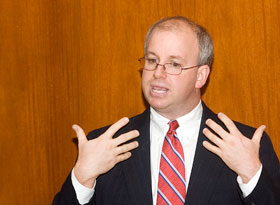  |
| HOME | THIS ISSUE | CALENDAR | GRANTS | BACK ISSUES | < BACK | NEXT > |
Yalof discusses political implications of nominee for Supreme Court Chief Justiceby Richard Veilleux - September 26, 2005 |
||||
|
With the confirmation of U.S. Circuit Court Judge John Roberts as Chief Justice of the United States Supreme Court all but assured, key Democrats are considering voting against the jurist to send a message to President Bush, says David Yalof, associate professor of political science. “Dianne Feinstein (D-Calif.), Charles Schumer (D-New York), and even Connecticut Sen. Joseph Lieberman are weighing whether to use their votes to send a message that if Bush puts up a more conservative nominee to fill (retiring Justice Sandra Day) O’Connor’s seat, they would fight it,” Yalof said. “They’re saying ‘we’ll vote against him even though we know he’ll win.’ It’s a bizarre way to send a message, but that’s the thinking.” The Sept. 19 lecture was one of several events at the University celebrating Constitution Day. Yalof, whose book, Pursuit of Justices: Presidential Politics and the Selection of Supreme Court Nominees, won the American Political Science Association’s Richard E. Neustadt Award as the best book published on presidential studies in 1999, said the actions of Democrats are perhaps the least of the problems Bush has in replacing O’Connor. She announced her retirement before Chief Justice William Rehnquist died last month, giving Bush two picks on the nation’s highest court. He also is being pressured by Hispanics to replace O’Connor with a Latino; and women’s organizations – as well as Bush’s wife, Laura – are pressuring him to replace her with another woman. That pressure hasn’t been evident in the effort to replace Rehnquist, as Roberts sailed through his confirmation hearing. But Yalof said Roberts is far from an unknown, despite his sometimes evasive answers to questions from the committee. Besides, Yalof said, people should not take what they hear during confirmation hearings too seriously. He noted that during his confirmation hearings, Justice Clarence Thomas said he believed in the constitutional right to privacy. Two years ago, Thomas ruled against privacy rights in the case of Lawrence v. Texas. Also, Yalof said, “Roberts is not an outsider to the Washington establishment. He probably has more credentials than many of the D.C. regulars. He has argued 39 cases before the Supreme Court, and has won 25. He is part of the court culture in Washington.” Roberts also has written more than 50 decisions from his seat on the Circuit Court bench, and he wrote many memos during his service with former President Ronald Reagan.
And despite sometimes angering the people he fought in court, his affable nature led some of those same people to sing his praises as an advocate. Yalof suggested that Roberts would be a “deferential conservative,” referring to a paper written by Jeffrey Rosen, a journalist and law professor at George Washington University who identified five categories of conservative jurists. “A deferential conservative thinks the court should play a very limited role in politics,” Yalof said. “Former justices Felix Frankfurter and Byron White were deferential conservatives. They like to use government while they’re immersed in it, and they deferred to the government while they were sitting on the court.” Rehnquist, whom Roberts will replace, was “very tough to pigeonhole,” he said, deciding to name him “a cross between an originalist conservative and a traditional conservative.” ‘Originalist conservatives’ insist on a strict interpretation of the Constitution according to the Framers, a label that fits Supreme Court Justice Antonin Scalia “to a T,” Yalof said. A ‘traditionalist conservative’ thinks the role of judges is to slow things down, to be slow and steady in deciding issues of law. Justice David Souter, he said, is a perfect example of that. The other two types of conservatives – libertarian and pragmatic – are, respectively, jurists who are anti-government to the extreme (Clarence Thomas) or obsessed with reaching decisions that will help the government function smoothly, which fits O’Connor. In the end, regardless of the Roberts appointment and O’Connor’s replacement, Yalof said, “The Constitution will survive. It always has.” |
| ADVANCE HOME UCONN HOME |

